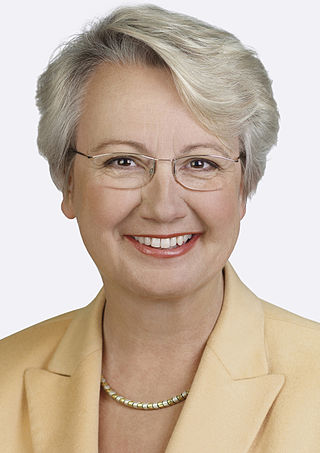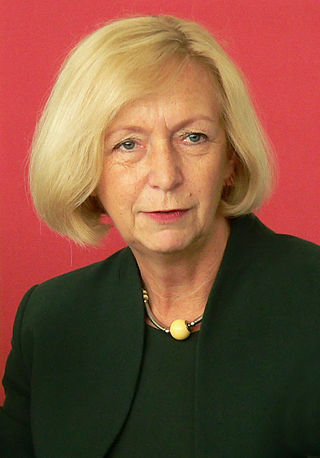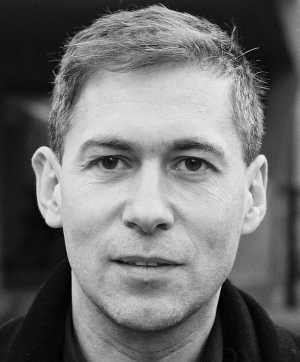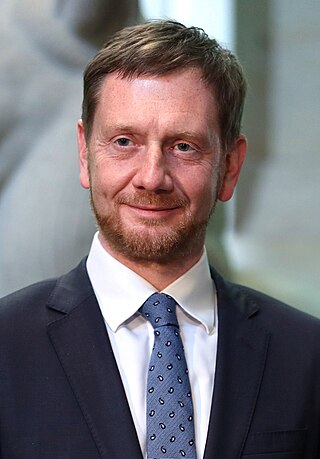
The Max Planck Society for the Advancement of Science is a formally independent non-governmental and non-profit association of German research institutes. Founded in 1911 as the Kaiser Wilhelm Society, it was renamed to the Max Planck Society in 1948 in honor of its former president, theoretical physicist Max Planck. The society is funded by the federal and state governments of Germany.

Joachim Sauer ForMemRS is a German quantum chemist and professor emeritus of physical and theoretical chemistry at the Humboldt University of Berlin. He is the husband of the former chancellor of Germany, Angela Merkel. He is one of the seven members of the board of trustees of the Friede Springer Foundation, together with former German president Horst Köhler and others.

Annette Schavan is a German politician of the Christian Democratic Union (CDU). She was the Federal Minister of Education and Research in the government of Chancellor Angela Merkel from 2005 to 2013, when she resigned following the revocation of her doctorate due to plagiarism. From 2014 until 2018 she served as the German Ambassador to the Holy See. From April 2018, she also briefly served as first German Ambassador to the Sovereign Military Order of Malta.

The Gottfried Wilhelm Leibniz Prize, or Leibniz Prize, is awarded by the German Research Foundation to "exceptional scientists and academics for their outstanding achievements in the field of research". Since 1986, up to ten prizes have been awarded annually to individuals or research groups working at a research institution in Germany or at a German research institution abroad. It is considered the most important research award in Germany.

Peter Gruss is a German developmental biologist, president of the Okinawa Institute of Science and Technology, and the former president of the Max-Planck-Gesellschaft.

The Berlin-Brandenburg capital region is one of the most prolific centers of higher education and research in the world. It is the largest concentration of universities and colleges in Germany. The city has four public research universities and 27 private, professional and technical colleges (Hochschulen), offering a wide range of disciplines. Access to the German university system is tuition free.

Ute Frevert is a German historian. She is a specialist in modern and contemporary German history, as well as social and gender history. In January 2008, she was appointed managing director of the Max Planck Institute for Human Development and director of the Institute's Center for History of Emotions in Berlin.

The Berlin-Brandenburg Academy of Sciences and Humanities, abbreviated BBAW, is the official academic society for the natural sciences and humanities for the German states of Berlin and Brandenburg. Housed in three locations in and around Berlin, Germany, the BBAW is the largest non-university humanities research institute in the region.

Johanna Wanka is a German politician of the Christian Democratic Union (CDU) who served as federal minister for education and research in the government of Chancellor Angela Merkel from 2013 until 2018. From 2000 to 2009, she served as minister for science, research and culture of the state of Brandenburg, then from 2010 to 2013 she served as minister of science and culture of the state of Lower Saxony, in the Cabinet McAllister.

Kai A. Konrad is a German economist with main research interests in public economics, microeconomic theory, political economy, and public finance.

Robert Klaus Freiherr von Weizsäcker is a German economist, Chess Grandmaster, and Honorary President of the German Chess Federation. He has held the Chair of Economics, Public Finance and Industrial Organization at Technical University of Munich. He is the eldest son of the late former German President Richard von Weizsäcker (1920–2015).

Andreas Pinkwart is a German politician and academic who served as State Minister for Economic Affairs, Digitization, Innovation and Energy in the governments of Ministers-President Armin Laschet and Hendrik Wüst of North Rhine-Westphalia from 2017 to 2022 and as Deputy Minister-President and State Minister for Innovation, Technology and Research from 2005 to 2010. He previously was the Dean of HHL Leipzig Graduate School of Management and holder of the Stiftungsfonds Deutsche Bank Chair of Innovation Management and Entrepreneurship.

Henrik Enderlein was a German economist and political scientist. He was president and professor of political economy at the Hertie School in Berlin and founding director of the Jacques Delors Centre at the Hertie School. He held degrees from Sciences Po, Columbia University and earned his PhD at the Max Planck Institute for the Study of Societies. From 2001 to 2003, he worked as an economist at the European Central Bank. He held visiting professorships at Harvard Kennedy School and at Duke University.
Dr. Julie Ann Elston is an American economist. She is a professor of business in the College of Business and an adjunct faculty member in the School of Agricultural and Resource Economics at Oregon State University. Dr. Elston graduated from the University of Washington's Department of Economics, and has held academic positions at the Wissenschaftszentrum Berlin in Germany, the Hoover Institution Stanford University, the California Institute of Technology, the Institut für Entrepreneurship und Innovation, Wirtschaftsuniversität (WU) Wien, and the Max Planck Institute for Entrepreneurship, Growth and Public Policy. She has consulted to a number of national and international organizations including the OECD, the Deutsche Bundesbank, the National Academies of Sciences, the Central Bank of the United Arab Emirates, and the American Institute for Contemporary German Studies.

Detlev Ganten is a specialist in pharmacology and molecular medicine and is one of the leading scientists in the field of hypertension. He founded the World Health Summit in 2009. He was Chairman of the Foundation Board of the Charité Foundation (2005–2015), editor of the Journal of Molecular Medicine, Chairman of the Board of Trustees of the Max Planck Institute of Colloids and Interfaces and Max Planck Institute of Molecular Plant Physiology as well as Chairman of the Board of Trustees of the Ethnological Museum Dahlem of the Prussian Cultural Heritage Foundation.

Axel Börsch-Supan is a German researcher, economist and director of the Munich Center for the Economics of Aging (MEA) at the Max Planck Institute for Social Law and Social Policy in Munich, Germany. He is Professor of Economics and Chair for the Economics of Aging at the Technical University of Munich. Additionally, he is Managing Director of SHARE-ERIC. An important field of his empirical research focuses on socio-political issues that are associated with economic aspects of demographic change and the aging of the population.

Michael Kretschmer is a German politician of the Christian Democratic Union (CDU) who has been serving as Minister President of Saxony since December 2017. Since 2022, he has been one of four deputy chairs of the CDU, under the leadership of chairman Friedrich Merz.
Hans-Jörg Rheinberger is a Liechtensteiner historian of science. He was director of the Max Planck Institute for the History of Science in Berlin from 1997 to 2014. His focus areas within the history of science are the history and epistemology of the experiment, and further the history of molecular biology and protein biosynthesis. Additionally he writes and publicizes essays and poems.

Günter Petzow was a German materials scientist and the director at the Max Planck Institute for Metals Research.

Robert Schlögl is a German chemist known for research in catalysis. Currently, he is the Director and Scientific Member of the Fritz Haber Institute of the Max Planck Society in Berlin and the Max Planck Institute for Chemical Energy Conversion in Mülheim an der Ruhr. He became president of the Alexander von Humboldt Foundation in 2023.

















